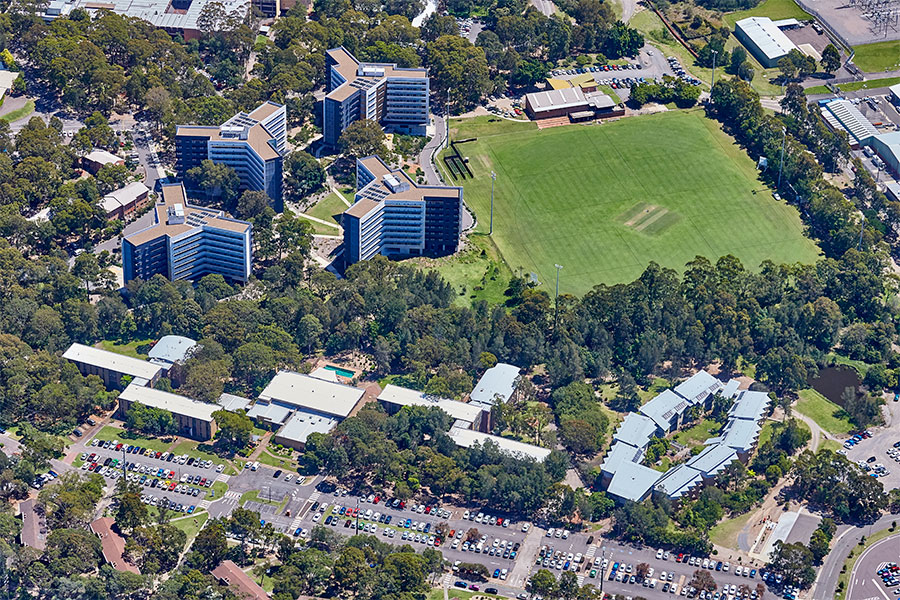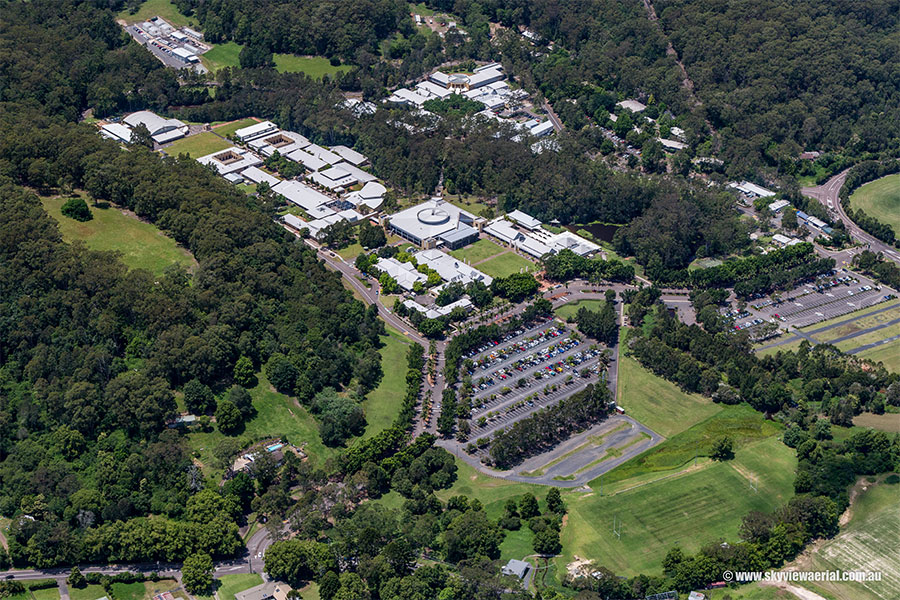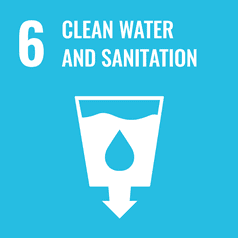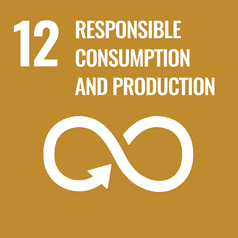Water Management Solutions
Water security is the fundamental goal of our society to ensure we all can benefit from water, manage destructive impacts and risks, and maintain an acceptable quantity and quality of water.
The University of Newcastle is focused on the sustainable management of water through world-leading research and education, industry partnerships, on-campus water consumption tracking and water re-use initiatives, waste water treatment and prevention of water system pollution, and water-conscious planting and buildings on all campuses.
Water Consumption Tracking
The University partnered with Hunter Water to undertake a detailed water usage audit and installed real-time water meter monitoring devices across all campuses to understand water consumption and identify water efficiencies. The audit highlighted water leaks and identified water efficiency measures. The University has now installed water meters with alarm notifications across all its campuses to alert university staff to unexpected usage rates and internal water mains failures.
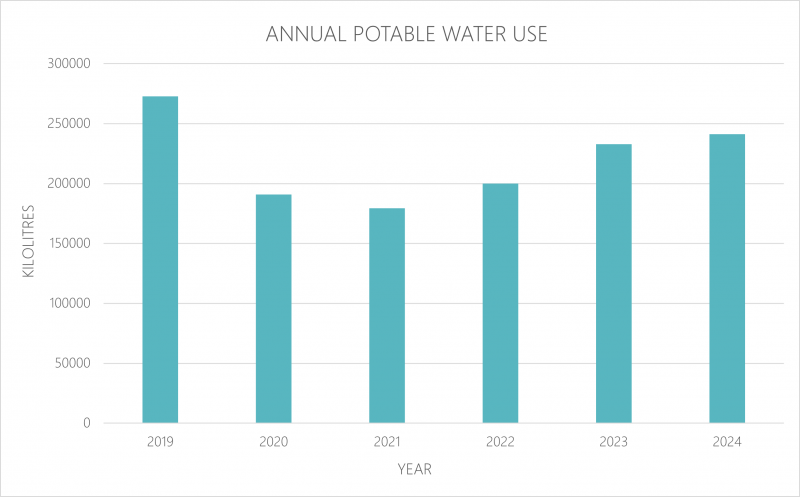
The University exceeded the Environmental Sustainability Plan target to reduce mains water usage/m2 of gross floor area by 15% on a 2015 baseline, by achieving a 24% reduction. Despite a 28% increase in the university’s gross floor area and student growth from (EFTSL) 14,693 to (EFTSL) 25,228 from 2001 to 2021, water consumption has decreased from 250,940 kl to 191,000 kl.
Water management research and education
In consultation with industry and government stakeholders, the University of Newcastle has created the Water Research Roadmap to guide research into water management for regional communities.
The University has also set up Research Groups and Centres that foster industry and community engagement to increase education, and support environmentally sustainable outcomes for water management. These include:
- The Centre for Water, Climate and Land
- The Water Resources Engineering Research Group
- The Centre for Water Security and Environmental Sustainability
- The Environmental Water Science Research Group
These Research Groups and Centres investigate water quality impacts on drinking water catchments, new domestic rainwater harvesting systems, grey-water re-use, urban storm-water runoff control, and constructed wetlands for waste-water treatment. The University also offers Advanced water science and resource management on modern management of water supply resources.
The University offers undergraduate training, PhD Masters supervision, professional development, evidence-based knowledge, enabling technologies and management tools to optimise water resources for environmental, social and economic benefit. The University also conducts research that has significant implications for water security.
University research collaboration initiatives

Drones to predict where water pipes are at risk of bursting
With leaking and burst water pipes costing water authorities and consumers time and money, as well as wasting a precious resource, researchers at the University of Newcastle are developing drone technology to help predict which areas, and even which specific pipes, are at risk of water loss.
Read more

University of Newcastle announces the best “hack” for water security
The New Futures Hackathon for Water Security saw seven teams learn from water security experts from Hunter Water, City of Newcastle, Hunter H2O, and the University of Newcastle before embarking on a 10 hour “hack” to evolve their ideas into a viable, technological solution.
Read more

Antarctic ice cores reveal Australian drought risk worse than thought
Antarctic ice core records have shown that eastern Australia’s drought risk is greater than thought.
Read more

Hydro Harvester is making a splash to solve global water shortage
In what could be a game-changer for solving the world’s water shortage problem, an atmospheric water generator (AWG) developed at the University of Newcastle is one step closer to commercialisation.
Read more

International recognition for University’s green initiatives
The University of Newcastle has been awarded three of the eight 2020 Australasian ‘Green Gown Awards’ in the categories of Climate Action, Benefiting Society and Student Engagement.
Read more

University of Newcastle joins HEAL network to tackle health impacts of climate change
Australians will be better protected against the health impacts of climate change, thanks to the Healthy Environments And Lives (HEAL) network, with partners from across Australia, including the University of Newcastle, and $10 million in Federal Government funding.
Read more
Waste-water treatment and water pollution prevention
The University relies on public authority waste-water treatment for all campuses and these authorities have licences with the EPA that prescribe processes and discharge limits. Providers for sewage wastewater discharged include the Hunter Water Corporation for the Callaghan and Newcastle campuses, Central Coast Council for Ourimbah and Gosford campuses, Sydney Water Authority for the Sydney campus, the Tamworth Regional Council for the Tamworth campus, Mid Coast Council for the Taree campus, and Port Macquarie Hastings Council for the Port Macquarie campus. Trade Waste Pit & Stormwater pit regular servicing is undertaken by the UON site cleaning contracts.
The Hydraulic Services Guiding Principles sets out the University’s infrastructure requirements for plumbing, drainage, stormwater, water, and gas services, and ensures new and refurbished systems are energy efficient, fit-for-purpose, and made from high quality, durable materials.
All waste processes of the University comply with the Environmental Sustainability Policy and the NSW Environment Protection Authority (EPA). On-site sewage tanks all have fault and high-level alarms to notify staff prior to any overflow and subsequent environmental impact. Facilities cleaning and grounds contractors have access to spill kits via Security Services to respond to and contain site spills and engage Hazmat services to minimise environmental impacts.
The University has strict health and safety requirements for laboratory safety that include management of biohazards, chemicals and hazardous materials, genetically modified organisms, hazardous substances. The Chemical Management Procedure includes information on spill kits. The PC2 Laboratory Safety Manual provides detailed information on managing spills.

Free Drinking Water
Explore our on-campus initiatives through the University's Green Maps, including the locations of free drinking water fountains.
Free water is provided to all students, staff and visitors at all University campuses through drinking water fountains as well as filtered hot and cold water in student and staff kitchen facilities/survival stations. Water from any tap in common areas (such as bathrooms) is sourced from Hunter Water, and is drinking quality.
Water re-use
The university’s priority actions to maximise water re-use include:
- Setting targets in the University’s Environmental Sustainability Plan to reduce mainswater usage/m2 by 15% by 2025.
- Increasing natural irrigation of bushland to reduce demand for potable water
- Integrating Water Sustainable Urban Design principles into landscape management
- Integrating water efficiency as a key project design component of the Environmental Sustainable Design (ESD) Guideline Tool
- Ensuring all new buildings meet the Green Building Council of Australia 6 Star rating which specifies water efficiency requirements
- Measuring water re-use from tanks from approximately 300 kL in 2018 to 1,229 kL in 2021, due to additional tank capacity, higher rainfall, maintenance on existing tank systems and better commissioning oversight of new tank systems
- Installation of two 1.1 million litre rainwater tanks to irrigate sporting fields and reduce demand for potable water, as well as additional tanks installed during 2021 include 2 x 1,000 kL tanks for oval irrigation and an additional 70 kL of rainwater tank capacity was installed with new buildings and building refurbishments
- Construction of two million litres of stormwater retention ponds to irrigate ovals, three 1,000 kL dams with re-use volume 1,042 kL/yr tank capacity in 2021 for oval irrigation
- An additional 15 campus buildings have rainwater re-use systems connected to internal plumbing and amenities to offset mains water for toilet flushing.

The University of Newcastle acknowledges the traditional custodians of the lands within our footprint areas: Awabakal, Darkinjung, Biripai, Worimi, Wonnarua, and Eora Nations. We also pay respect to the wisdom of our Elders past and present.
